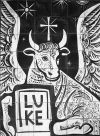
The Gospel of Luke
The way to Jerusalem: Lk 13,22-35
The Narrow Door: 13,22-30
Although there is a division with the comment about Jesus continuing on his way to Jerusalem in 13,27, we can also see continuity through from the parables as Jesus points out the narrow door which leads to the kingdom.
"Knocking at the door" is a theme of the letter to the Church of Laodicea in the Apocalypse (Apoc 3,20). As here in Luke, there is a reference to table fellowship. For early Christians, those who knocked at the door to be rejected (13,27) would have been the Jews. They themselves would have been among those from east and west, north and south, to recline at the table in the Kingdom.
Isaiah already speaks of the banquet at the end of time in one of the later oracles of the prophecy (Is 25,6-8). The universal message is clear: "all peoples".
Thus verse 29 has echoes in Psalm 107, though the psalmist would originally have been thinking of Jews who have come from many places on pilgrimage to Jerusalem.
We can return to the main page.
Herod: 13,31-35
It's curious that chickens are no further away than verse 35. It is not clear if the evangelist intended a link with the fox Herod.
The key word in verse 33 is "I must", literally "it is necessary for me". There is that strong sense in this Gospel that Jerusalem in the place of destiny towards which Jesus must make his way (13,22). The reference to the third day in verse 32 could well be a reference to the tomb and the resurrection. The verb here means "accomplish" or "fulfill" (Jn 19,30).
Deuteronomy (Dt 32,11-120, speaks of the Lord guiding his people like an eagle spreading its wings. Psalm 91, a psalm of trust in God, says "under his wings you will find refuge" (Ps 91,4).
"Blessed is he who comes in the name of the Lord" in verse 35 is used at the entrance into Jerusalem (19,38). It comes from Psalm 118, a psalm which as read by Christians has many references to Jesus's triumph.
We can now return to the main page.
The Sunday Gospel
The reading from Isaiah highlights the gathering of the nations to witness to the glory of the Lord. These are almost the last words of this long prophetic book. As I suggested, it would have been good to have included the vision of the new heavens and the new earth in verse 22. This theme was later picked up and developed by the Apocalypse (Apoc 21,1).
Thus the choice of this reading from Isaiah highlights those who will come to the table in the kingdom of God (Lk 13,30) rather than pointing towards those who will be excluded (Lk 13,27).
Return to the main page.
